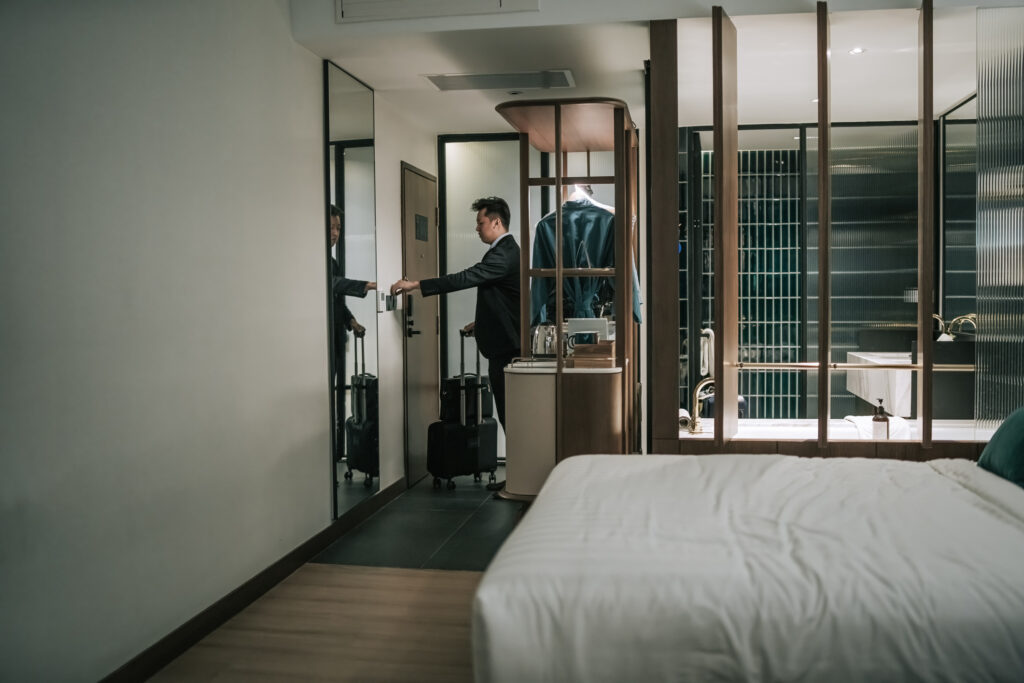What is Search Impression Share in Google Ads?
Analyzing hotel advertising campaigns can be incredibly overwhelming. Each channel has a different set of metrics, and keeping track of what’s what can be hard.
Search Impression Share in Google Ads is one of those unique metrics that often causes confusion. However, this metric can provide an incredible amount of insight into your hotel’s paid search campaign performance, so it’s important to understand what the metric is, how it’s calculated, and what factors can affect it.
The Google Ads auction system
Before discussing Search Impression Share, it’s helpful to understand how paid search ads are served through Google Ads.
Each time that a user searches for something on Google, the Ads platform enters all potentially relevant ads into an auction for that individual search. Paid search advertising with the best combination of bid and budget, relevance to the search, historical performance, and other factors will win the auction, appearing on the search engine results page (SERP).
If a paid search ad does not perform well in the auction, it will not appear in the SERP. However, that ad may show up another time since a brand new auction occurs for each individual instance of a search.
Multiple ads can appear in the SERP at the same time, with ads that performed best in the auction showing up highest in the list of results compared to their auction competitors. However, there isn’t enough space in the SERP for every paid search ad to show up every time. The main purpose of the Google Ads auction system is to weed out the least effective paid search ads for a specific search. Therefore, it’s important to understand how well your paid search ads compete, which is where Search Impression Share metrics come into play.
Search Impression Share
Search Impression Share measures how often your hotel’s paid search ads win an entered auction, representing the proportion of impressions actually received compared to potential impressions.
How Search Impression Share is calculated in Google Ads
Search Impression Share = Actual Impressions / Potential Impressions
Or, in other words: Search Impression Share = Auctions Won / Auctions Entered
You can think of this metric as an “actual” or “visible” percentage for paid search ads.
Search Impression Share Lost to Rank
This metric represents how often your hotel’s paid search ads lose an auction because a competitor’s ads are deemed a better, more relevant fit for the user’s search.
Factors that may affect Search Impression Share Lost to Rank:
Ad copy keyword optimization: When setting up a paid search campaign in Google Ads, adding positive keywords helps inform Google about the kind of searches that your ads should compete to show up for. These targeted keywords are not always a one-to-one match with a user’s query, but they provide a great foundation to ensure that your hotel’s ads appear in relevant searches.
However, targeted keywords aren’t always enough. Google Ads likes to see proof that your paid search ads are immediately relevant to a search and often looks at ad copy to determine relevance. Therefore, incorporating targeted keywords into ad messaging is an easy way to improve this relevance and decrease Search Impression Share Lost to Rank.
Search context: While targeted keywords are a great start regarding relevance, sometimes intent can get lost in a user’s search. Specific words and phrases often have a number of meanings, and this can get confusing without a direct line of communication to the user. For example, if a user searches for “cats,” it’s difficult to determine whether the user wants to adopt a pet, see a Broadway show, or buy heavy machinery.
Google Ads is fairly accurate in determining context to avoid serving irrelevant ads, but this doesn’t always prevent advertisers from being entered into irrelevant auctions. If your hotel’s paid search campaigns target keywords with a large variety of potential meanings, your Search Impression Share Lost to Rank may be inflated due to this broader pool of auctions in which your ads are competing.
Landing page experience: Because Google Ads can monitor ad performance beyond the click, the URL your paid search ads redirect to is just as important as the ad itself. Google Ads does not want to serve ads that provide a poor user experience post-click.
If your paid search audience routinely exits the page early, leaves without interacting with your website, or otherwise displays poor engagement, this could hurt Search Impression Share lost to Rank. Landing pages with excessively slow loading times, inconsistent reliability, and other undesirable qualities could also have a negative effect, even if these factors don’t directly impact your audience’s behavior.
Expected Clickthrough Rate (CTR): Because Google Ads wants to provide the best experience for users, the platform prioritizes paid search ads with high performance. Based on past data from your account as well as other advertisers, Google Ads can predict a paid search ad’s CTR within a specific search.
A high expected CTR suggests that a paid search ad is highly relevant, increasing the chances of winning auctions and improving Search Impression Share Lost to Rank. However, if Google Ads does not expect a paid search ad to perform well, this could negatively impact relevance in auctions and, therefore, Search Impression Share Lost to Rank.
Search Impression Share Lost to Budget
This metric represents how often your paid search ads lose an auction due to an insufficiently low daily campaign budget or Cost-per-click (CPC) bid.
Factors that may affect Search Impression Share Lost to Budget:
Bid strategy: Google Ads offers a variety of automated bid strategies to assist with auction bidding. These strategies inform Google Ads about the primary goal of your paid search campaigns, such as maximizing visibility or maximizing conversions, allowing the platform’s algorithm to tailor bids most effectively for each individual auction.
Each bid strategy is incredibly unique since each goal requires a different focus. Some bid strategies, such as “Maximize Conversion Value,” may end up prioritizing a low CPC bid to keep cost down, worsening Search Impression Share Lost to Budget as a result. Other strategies, though, such as “Target Impression Share”, may put very little focus on manageable CPCs, which could actually improve Search Impression Share Lost to Budget.
Total campaign budget: When running paid search campaigns, it’s a good idea to keep costs somewhat consistent over a given time frame. Budget should be spread out evenly across multiple hours, multiple days, or multiple months, which can impact the competitiveness of CPC bids.
For campaigns with higher total budgets, this allows more room to increase CPC bids. As these bids increase, your hotel’s ads are less likely to lose auctions due to budgetary restrictions, decreasing Search Impression Share Lost to Budget. But, of course, the inverse is true as well. With a limited daily budget, your paid search campaigns may be more prone to under-bidding, resulting in a higher Search Impression Share Lost to Budget.
Bid adjustments: Google Ads provides the opportunity to manually prioritize the most important audiences for your hotel’s paid search campaigns. Bid adjustments work in tandem with bid strategies and other CPC settings, increasing or decreasing baseline auction bids by a given percent. Negative and positive bid adjustments primarily apply to attributes of the user performing a search, such as their demographics, interests, and hobbies, or the device type they’re using.
Because bid adjustments are a modifier applied to a baseline auction bid, these settings can have either a positive or negative effect on Search Impression Share Lost to Budget. When using a large number of positive bid adjustments, this metric may decrease since CPC bids are more aggressive than the baseline for a large amount of auctions. Although this also means that negative bid adjustments can increase Search Impression Share Lost to Budget, since CPCs will be less competitive in those instances.
Maximum CPC settings: As part of Google Ads’ initiative to provide advertisers with more control, the platform allows for optional maximum bid settings. When added to a paid search account, these settings can ensure that CPCs remain reasonable by preventing bids from rising past a desired limit.
While these settings can help control campaign costs, it’s important to understand the potential tradeoff. If your paid search campaigns include maximum CPC settings that are less than the average price of an auction in your market, this can end up throttling your auction performance and causing an increase in Search Impression Share Lost to Budget.
Optimizing for Search Impression Share
Because each metric related to Search Impression Share results from so many factors, there’s really no baseline for what a “good” number will look like. Every business has different paid search campaign goals, unique market competition, and individual budget restraints, so there’s no “one size fits all” answer.
Despite this, there are still a few standard optimization rules to follow regarding Search Impression Share.
1. Aim to decrease Search Impression Share Lost to Rank
Because Search Impression Share Lost to Rank deals with ad relevance, most of the factors behind this metric are relatively easy to adjust with controlled optimization, making it possible to improve account performance without re-budgeting for your advertising channels.
2. Increase campaign budgets
Once your paid search campaigns are well-optimized, Search Impression Share Lost to Budget is the next metric to tackle. While the factors behind CPCs are slightly more complex than those behind ad relevance, increasing campaign budgets allows the flexibility for higher bids, acting as a simple way to gain a competitive edge in auctions.
3. Remember metric interactions
However, Search Impression Share Lost to Rank and Search Impression Share Lost to Budget are directly proportional to each other. When added together, actual Search Impression Share, Search Impression Share Lost to Rank, and Search Impression Share Lost to Budget will always add up to 100%. So, if one metric decreases, the others will increase, and vice versa.
4. Focus on visibility
Due to this proportional relationship, it may seem like an optimization related to Search Impression Share actually had a negative effect on the account. In reality, though, improving bids or relevance simply shifts the balance in one direction or the other. Therefore, focusing on total visibility paints a better picture of general performance. As long as the actual Search Impression Share remains flat or continues to improve, it’s safe to assume that your optimization techniques are working.
In summary
Search Impression Share in Google Ads is an incredibly complex web of factors that can tell you a lot about your hotel’s paid search campaigns. If you’ve been ignoring this metric, we suggest that you take a deeper look at your own campaigns to better understand how your advertising works and how to potentially optimize them in the future.
If you have more questions about Search Impression Share reach out now.





